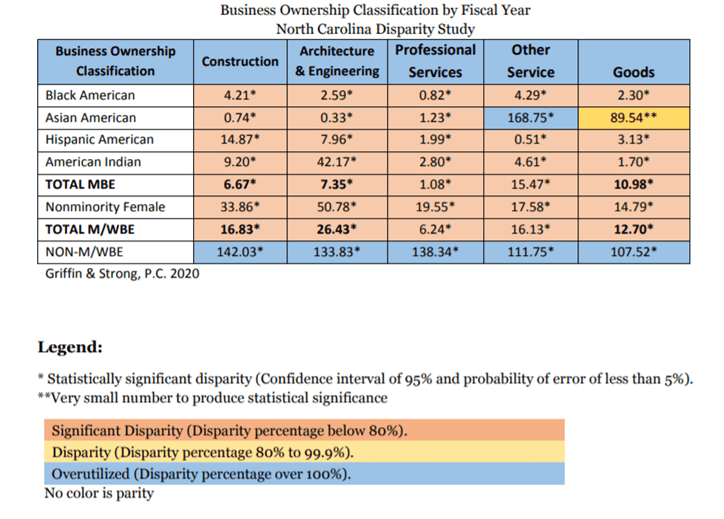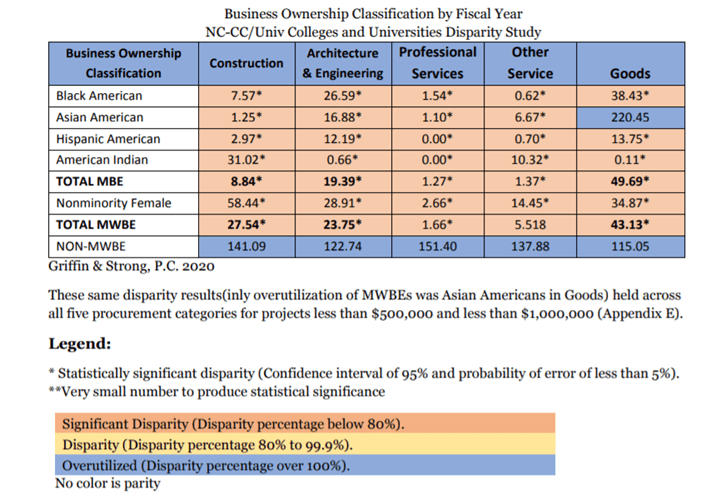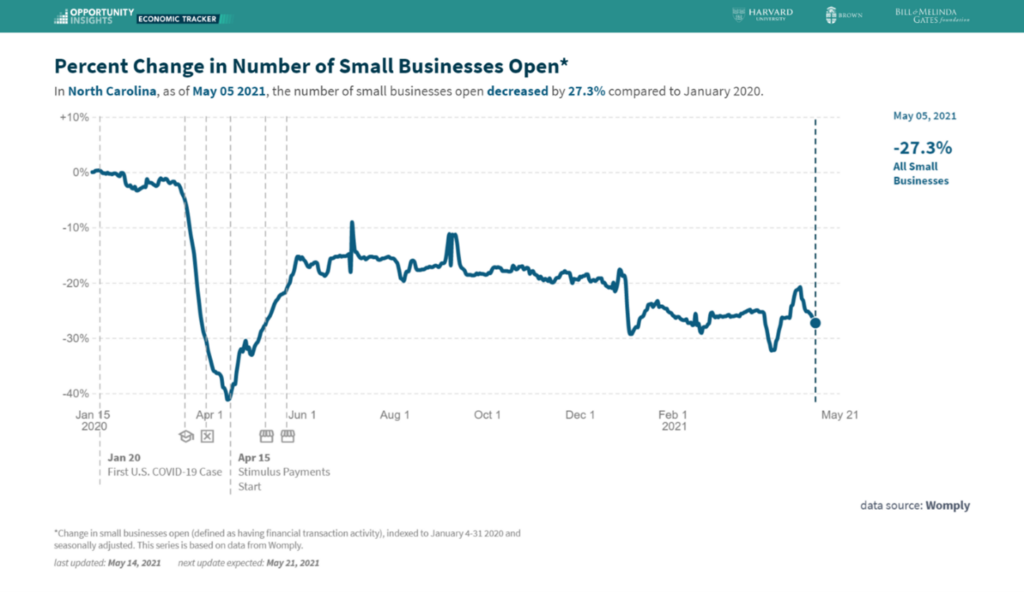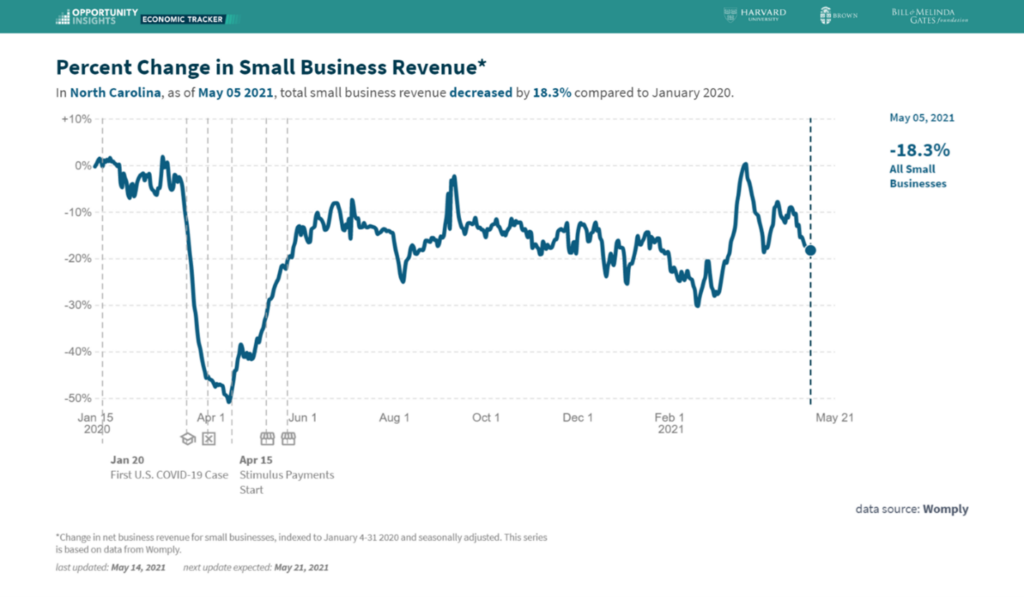Griffin & Strong Find Significant Disparities in N.C. Procurement: Non-Partisan Small Business Reserve Program is one of the Best Remedies for N.C.

The NC Department of Administration’s Historically Underutilized Business Office recently released a disparity study, researched by Griffin & Strong P.C., on the availability and utilization of minority and women business enterprises (MWBE) in government contracting. Researchers used procurement data from FY2014-2015 to look for and examine evidence of discrimination in North Carolina’s procurement practices.
Griffin & Strong released their data in two reports: one focused on the procurement practices of North Carolina State Agencies, and the other reports on the contracts doled out by North Carolina’s Universities and Community Colleges, in the Industry Categories of Construction, Architecture and Engineering (“A&E”), Professional Services, Other Services, and Goods. The reports show that in nearly all categories1, North Carolina State Agencies, Universities and Community Colleges significantly underutilized minority and women owned businesses in contracts given to firms in all five industry – categories.
In order to reveal disparities researchers at Griffin & Strong P.C., determined the percentage of W/MBE firms in each industry category that are willing and able to do business with North Carolina and compares that with the amount of contract money awarded to firms by North Carolina State Agencies, Universities, and Community Colleges. The reports revealed that disparities were greater in contracts provided by state agencies than the disparities from University and Community College contracts. According to the study, 21.02% of construction firms able to do business with North Carolina are MBEs and 12.55% are WBE, yet MBE Construction firms received only 1.84% of total dollars spent on State Agency Construction projects and WBE received 5.39% of the funds from State Agency Construction contracts. The report on Universities and Community colleges showed that MBEs received 2.86% of construction contracts and WBEs received 9.65% of the construction contract funding.
The disparities for contracts given to MBEs is far greater than the disparities for WBEs in both reports for nearly all categories. Griffin & Strong created a disparity index to show the level of under and overutilization of certain firms in various categories. Scores below 100 represent underutilization, scores over 100 represent overutilization and a score of 100 represents perfect utilization.


As the graphs above show, MBEs are underutilized at rates far greater than WBEs in all the Industry categories except for goods in the Universities and Community Colleges study. In order to address this, the State should decouple the procurement goals of MBEs and WBEs. North Carolina could look to Ohio which has separated their MBE program from their WBE program and is in the process of creating a hybrid program called the Encouraging Diversity, Growth and Equity (EDGE) Program. Ohio’s MBE program establishes 15% procurement goals for state contracts to be awarded to certified MBEs, along with Financial and Bonding Assistance and Management and Technical Assistance, while it’s WBE program does not allow set aside procurement goals.
In order to address the disparities in North Carolina procurement rates, Griffin & Strong made 12 Policy recommendations North Carolina can make to increase WMBE utilization. In accordance with the legal requirements for MWBE programs set forth in City of Richmond v. J.A. Croson Co., 488 U.S. 469 (1989), many of the policy recommendations are race neutral. Two of the recommendations are particularly timely in that they will help address North Carolina’s procurement disparities and help bolster small businesses ravaged by the pandemic. The recommendations are:
- Create a Small Business Reserve Program that allows only small businesses to bid on certain sized contracts.
- Implement Mandatory Subcontracting goals on large contracts to create more opportunities
These policy recommendations could help revitalize North Carolina’s small businesses that have been hit hard by the pandemic. As the below graphics show, both the number of small businesses open in North Carolina and the revenue that small business has generated is significantly lower than it was in January 2020 before the start of the pandemic. Creating a statewide a small business reserve program, modeled after Maryland’s small business reserve program could keep struggling small businesses from having to shutter their doors. The program would allow firms in the state to register as small businesses, and then compete for set aside projects that can only be awarded certified small businesses.


All small businesses, regardless of their ownership status have been hit hard by the pandemic. Creating a small business reserve program would help create more job opportunities for small businesses hurt by the pandemic. Moreover, since WMBEs tend to be disproportionally smaller with less access to the capital necessary to bid for large contracts, creating a small business reserve program with set-aside procurement goals and creating contracting jobs that require less access to capital would disproportionally help MWBEs, without enacting specific race-based resolutions that are often subject to political controversies and court challenges.
To help bolster MWBEs and all small businesses across North Carolina. Governor Cooper should establish a Small Business Reserve Program under the Office of Historically Underutilized Businesses, that offers 15% of State Agency procurement projects as set asides for certified small businesses.
